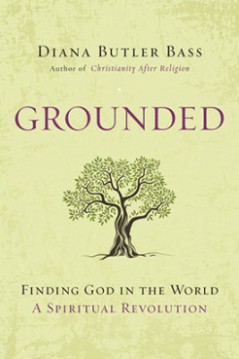(RNS) Four mornings a week, in the tranquil, blushing hours of morning, Diana Butler Bass drives to a familiar walking trail along the Potomac River and embarks on a two-mile stroll.
Creeping sunlight peppers the wooded scene. And the babble of active water silences the jangle of daily life.
Some days she finds a comfortable bench along the river where she can journal. Other days, she observes creation.
For Bass, a learned nature connoisseur, ardent gardener and noted religion academic, God does not merely exist inside reverent, adorned church spaces.
God also lives in the soil and exists in the elements.
“I have learned to love the dirt,” said Bass, a Christian progressive and author of nine books on American religion. “The dirt is a miniature universe. When I scoop up dirt in my hand I immediately think that I’m holding a universe. And then you can look up in the sky and there’s that universe above us.”

“’Grounded’ is my attempt to flesh out what I call a spiritual revolution — the spiritual awakening that’s happening — so that people can see it more clearly and see that it’s not that depressing of a time spiritually, or religiously,” she said. “But that we’re really moving toward an exciting new place.”
Many Christians practicing in mainline churches have long approached statistical findings of denominational decline with pessimism and hopelessness. But Bass’ reverie about the future of American Christianity stands out for this scholar — she holds a Ph.D. from Duke University — and believer.
“She’s seen in many ways by most of the mainline as carrying a torch for them,” said Scott Thumma, professor of sociology of religion for the Hartford Institute for Religion Research.
He notes that Bass’ credentials as an academic, Christian practitioner and lay theological communicator frequently help bridge the gap between those who practice Christianity and those who research it.
“What makes her an unusual voice among commentators in American religion right now is that she’s a proponent of hopeful religion,” said Thumma. “That’s not so common in what we study. The approach of her books and the research she’s done is focused on looking at what is working, looking for pockets of vitality and hope.”
In the past half-dozen years, Christian mainline churches have decreased in size and activity, attributed in part to married couples’ having fewer children, delayed childbearing, and competition and a general societal slide toward secularism.
And though many have exited church in recent years, or redefined themselves as religiously unaffiliated, Bass, who lives in Alexandria, Va., said she never desired to leave God or church behind.
That does not mean she has walked a linear Christian path. Bass was reared in the United Methodist Church, but as a teen she switched to an evangelical Bible church she remembers as mildly fundamentalist (it taught end times theology, or premillennial dispensationalism.)
In her late 20s, she heard a sermon from an Episcopal bishop identifying God as love. She had never known God described that way, and it was about that time she began asking herself questions about what she believed, and where she believed God to be.
“Faith journeys are always about growing up and maturing and seeing the world with new eyes,” said Bass, who today attends an Episcopal church but isn’t quite reconciled to an Episcopalian identity. “But they’re also about encountering God in new ways. It’s not just about a developmental or psychological maturing process, but it’s literally about having our hearts open toward where the sacred is present in the world.”
Rather than participate in the dialogue about the future of the mainline church in America with a naysayer’s attitude, Bass chooses to focus on the change.
She said participating in the spiritual revolution begins with an appreciation of God in nature and making a choice to practice simple and much-needed hospitality toward one’s neighbors.
“When you practice hospitality you immediately have walked into a territory of diversity or pluralism, or trying to include the other. So hospitality and diversity are intimately related,” she said. “I think there are Christian groups, and Jewish groups and Hindu groups and Muslim groups and all kinds of different religious communities, that practice it quite well. But as a country, we really struggle.”
Longtime friend and Christian author Brian McLaren, a similarly prominent voice in progressive American Christianity, said he and Bass have been kindred spirits for many years.
After reading “Grounded,” he said, he was moved by Bass’ elegant message to quit viewing religion as a holy elevator — a term used in the book — where God is sent down, and when people behave, they move up.
Instead, McLaren said, he likes Bass’ attempts to redefine God as creator and redirect the perspective on the beauty and heaven already on Earth.
“Grounded,” McLaren believes, will appeal to people who have left organized religion as well as people who know that something about their practice isn’t working.
He acknowledges, however, that some readers may put Bass in a liberal Christian box.
“A lot of people want to classify the world in terms of left and right, but you could say there are people trying to engage with God from deep to shallow,” he said. “I think the left-right conversation is shallow, and I think what Diana is trying to do is take people beyond left and right.”
So while the world debates politics and religion, liberal and conservative, heaven and hell, Bass points her attention to the church, to the Potomac and to her flower and vegetable garden, where she just planted broccoli on raised beds. In that place where seedlings grow and mature from the dirt, she will look to the soil and water to teach her about God.






